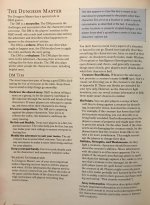I agree that most of those from Fitz' original example list would almost certainly give away position.
Let's talk about that for a moment, because I both agree and disagree. I mean, a bunch of approaches would give away that
something is there, but would they automatically reveal an invisible
creature? Let's go through a few ideas (not necessarily form my first list, because I don't stand by all of them).
1) Gettin' in your face.
I think this is the standard method most of us use to describe the reason for disadvantage when you're NOT invisible or hidden. You yell, swing a melee weapon around, whatever. Right? Obviously if you did THAT while hidden (invisible or not) you'd reveal yourself.
2) Blocking the shot.
Another idea is that you're so close to the ranged attacker, that blocking the shot (with a shield, weapon, or (in the case of monks, say) striking the "arrow" (or whatever it is) out of the air.
Aside: IRL, I've trained in blocking arrows with a staff. One of the methods, is simply to hold the staff out in front of you upright (bottom forward). IF an arrow strikes the staff, it will deflect around you. It's not perfect, but it's better than nothing.
Let's say that happens in our game scenario (it should become quickly apparent that there could be limitless examples based on the combination of attacker/defender, etc) but for now. Arrow vs Staff. Depending on exactly how the arrow deflects off the staff, it might not even be obvious to the shooter what happened. Their arrow left their bow, and went slightly the wrong way. Maybe it made a head-on-wood ping/scrape, but then, your bow should just have finished making it's
twang. Can you hear it over that? Do you automatically know that there's a guy with a staff? Do you think you screwed up your shot? We have no way of knowing. In fact, we (as storytellers) get to choose.
Again, this is also dependent on who is the player and who is the monster. It's easier if the shooter is the monster. The DM can just describe him going "WTF?" and move on. The player can feel good about themselves. If it's the other way around, you can tell the player "roll with disadvantage". They roll low. Your arrow deflects left. They can
choose if they think that it means there's an invisible creature there and search, or not. It'll be up to them.
Maybe I'll come back and do some more ideas, but I've run out of time. Let me know what you think of that, first.



